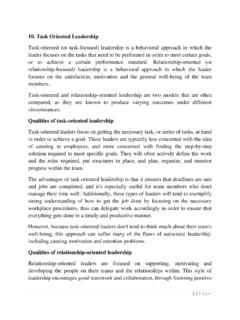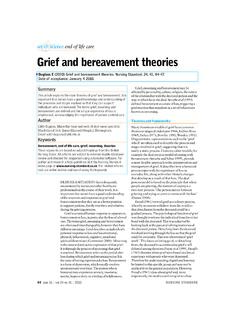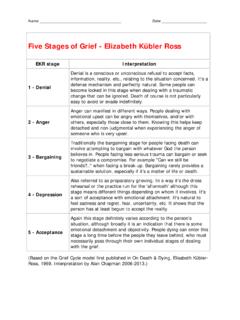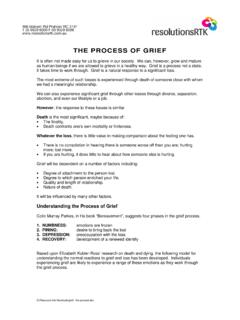Transcription of COUNSELING SKILLS AND TECHNIQUES 4. GRIEF …
1 1 COUNSELING SKILLS AND TECHNIQUES 4. GRIEF COUNSELING What Do GRIEF and Bereavement Really Mean? Most can agree with the simplistic definition that GRIEF is a keen mental suffering or distress over affliction or loss, sharp sorrow, and/or painful regret. As we can see, GRIEF is not too abstract a term for us to define, because to some degree we have all experienced GRIEF or seen it displayed in others. Though it is not a hard term to wrap meaning around, it is however a complex entity in itself. It is presented differently in everyone through variances in intensity, complexity, duration, and the properties and stages that one experiences.
2 Webster also defines bereavement as the state of sorrow over the death or departure of a loved one . This term also seems pretty simple and equates to the reactions one goes through after losing a loved one. Again, the terms may be simple, but the emotions attached to both are very complex. Now that there is an established common understanding of the terms, one might raise the question, is there a difference between GRIEF and bereavement? Yes. Most experts offer an explanation similar to the following: bereavement is a term specifically used to describe the effects experienced from the death of a significant other, whereas GRIEF can describe any sort of loss not necessarily related to death, : loss of control, loss of money, or divorce.
3 Stages of GRIEF In 1969, Elisabeth Kubler-Ross published a model to explain the stages of GRIEF . This model is not specific to bereavement or the death of someone. Rather, this model is used for GRIEF associated with trauma and change. In the matter of GRIEF associated with death, this model can be applied to anticipatory GRIEF experienced by one who is facing their own death or to the loved ones who are preparing for the death of a significant one in addition to the bereavement experienced following the death of someone. She denotes that there are five stages: denial, anger, bargaining, depression and acceptance.
4 She also states that the bereaved may not go through all five stages, nor follow the steps in sequence, and that one may experience a stage more than once. She does express that most individuals will experience at least two of the stages. The stages are not linear nor are they equal in the time one 2 spends per stage . A person does not have to complete a stage in order to progress into another stage . Goals of GRIEF COUNSELING & GRIEF Therapy There is a difference in the goals of GRIEF COUNSELING and GRIEF therapy. The term GRIEF COUNSELING is most often reserved for helping someone work through the process of GRIEF via one-on-one COUNSELING or through group work.
5 The goals of GRIEF COUNSELING are to aid the individual through uncomplicated, normal GRIEF to a healthy resolution of the tasks of grieving within a reasonable amount of time. Goals of GRIEF COUNSELING typically include helping the bereaved move toward acceptance through guiding the individual to talk about the loss, who the person was to them, and the circumstances surrounding the death. In addition, it is important to help the bereaved label and describe their feelings and emotions encompassing the loss. Another important goal of GRIEF COUNSELING is to help the individual learn coping strategies for tough times, such as anniversaries, holidays, birthdays, and milestones.
6 Letting the bereaved know that the emotions they are feeling are normal and expected is also a significant component of GRIEF COUNSELING . Two very critical constituents of GRIEF COUNSELING include helping the bereaved to understand their coping behavior and to identify coping mechanisms that are problematic or unhealthy for the individual. Without these basic principles, the person may continue these unhealthy patterns and may need more extensive treatment such as GRIEF therapy. GRIEF COUNSELING is a form of psychotherapy that aims to help people cope with GRIEF and mourning following the death of loved ones, or with major life changes that trigger feelings of GRIEF ( , divorce).
7 GRIEF counselors feel that everyone experiences and expresses GRIEF in their own way, often shaped by culture. They believe that it is not uncommon for a person to withdraw from their friends and family and feel helpless; some might be angry and want to take action. Some may laugh. GRIEF counselors hold that one can expect a wide range of emotion and behavior associated with GRIEF . Some counselors believe that in all places and cultures, the grieving person benefits from the support of others. Further, GRIEF counselors believe that where such support is lacking, COUNSELING may provide an avenue for healthy resolution. GRIEF counselors believe that GRIEF is a process the goal of which is "resolution.
8 " The field further believes that where the process of grieving is interrupted, for example, by simultaneously having to deal with practical issues of survival or by being the strong one and holding a family together, GRIEF can remain unresolved and later resurface as an issue for COUNSELING . 3 GRIEF COUNSELING becomes necessary when a person is so disabled by their GRIEF , overwhelmed by loss to the extent that their normal coping processes are disabled or shut down. GRIEF COUNSELING facilitates expression of emotion and thought about the loss, including sadness, anxiety, anger, loneliness, guilt, relief, isolation, confusion, or numbness.
9 It includes thinking creatively about the challenges that follow loss and coping with concurrent changes in their lives. Often people feel disorganized, tired, have trouble concentrating, sleep poorly and have vivid dreams, and experience change in appetite. These too are addressed in COUNSELING . GRIEF COUNSELING facilitates the process of resolution in the natural reactions to loss. It is appropriate for reaction to losses that have overwhelmed a person's coping ability. There are considerable resources online covering GRIEF or loss COUNSELING such as the GRIEF COUNSELING Resource Guide from the New York State Office of Mental Health.
10 GRIEF COUNSELING may be called upon when a person suffers anticipatory GRIEF , for example an intrusive and frequent worry about a loved one whose death is neither imminent nor likely. Anticipatory mourning also occurs when a loved one has a terminal illness. This can handicap that person's ability to stay present whilst simultaneously holding onto, letting go of, and drawing closer to the dying relative. In March 2007, GRIEF COUNSELING and GRIEF therapy were placed on a list of treatments that have the potential to cause harm in clients in the APS journal, Perspectives on Psychological Science. In particular, individuals experiencing "relatively normal bereavement reactions" may experience worse outcomes after receiving GRIEF COUNSELING .


















